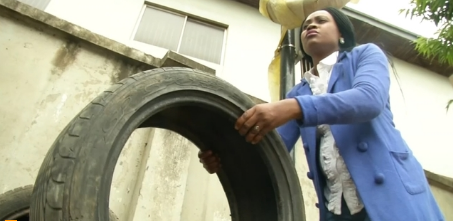
LAGOS, Nigeria (Reuters) — Olamide Babajide goes out on the streets of Lagos to shop for old tires, a key component for her furniture products.
Babajide is the founder of Pearl Recycling, a company that transforms recyclables like car tires, magazines, straws, plastics and wood among other things into household items.
The company also offers money in exchange for recyclable garbage.
Pearl Recycling was set up in 2014 with 5,000 U.S dollars that Babajide won through an entrepreneurship program.
The computer engineering graduate says she was drawn to recycling while on a trip to the United Arab Emirates, where she came across art pieces made from maize stalks that sold for hundreds of dollars.
With a population of about 21 million, Lagos generates up to 10,000 metric tons of waste per day, according to the Lagos State Waste Management Authority (LAWMA).
Babajide says a significant amount of this waste can be used to make money.
“Over time I noticed that waste is a general problem, waste management is a problem in Nigeria that we have not been able to find a solution. Most times we see government coming up with sanctions, threats and you know penalties but it’s not working. So I felt the best way to make it work is to find a solution, where people can make money out of waste or turn waste to something good. So that was what brought the idea, the vision for Pearl Recycling,” said Babajide.
The company employs three staff members and has trained about 20 people to make both functional and ornamental pieces.
It takes about 45 minutes to make a pouf out of recycled tires. Her products cost anything from 5,000 naira (16 US dollars) to 20,000 naira (65 US dollars).
The government is pushing people to find innovative ways of making money as the oil rich country continues to face a recession due to low global oil prices, making it difficult for entrepreneurs to run their businesses.
Olamide said that although the recycling sector is relatively small in the country it has the potential to lift many people out of poverty.
With about seven orders in a month, Olamide makes about 3,286 dollars a year. She has also exhibited her work in parts of Africa and the Middle East.
She says Pearl Recycling is still facing financial challenges that hinder growth.
“Basic challenge is still funds, because we need funds to produce, we need funds to get machines. Most of the things we do are manual, except maybe for the drilling machines and all that. We still need some machines for cutting, for other tasks. It is capital intensive but we have been able to find a way around it manually, but we believe that if we have funds we can achieve more,” says Olamide.
Tolulope Akinwunmi, an accountant and interior designer says she came across Pearl Recycling a few years ago on the internet and has been buying their products ever since.
“I am here today to pick one for a client who we are doing an interior for and for a while the furniture are durable, they are beautiful, they are unique you know, compared to what you can see in the regular market,” said Akinwunmi.
Babajide plans to open stores in other cities, providing practical furniture while contributing toward efforts to protect the environment.







